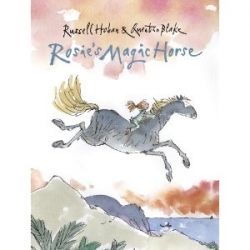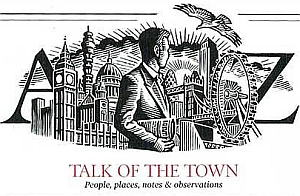Nonetheless my colleagues at Thoughtcat alerted me to this SA4QE business some time ago and now here I am contemplating taking part. Hoban’s masterly book has, after all, provided a great deal of inspiration through the years of writing and trying to write, of having girlfriends and being alone and being married and being alone again and getting into trouble with the law and everything else that happened and which I documented in my book All My Own Work, which the Thoughtcat people have kindly published, so it’s only right that I should honour the book in this way. Quite how though I don’t know.
The number of times I’ve read Medusa now and still something like panic comes over me when I sit down and read it, as if there’s something I might be missing or not understanding or not fully perceiving in it. Likewise, trying to choose a quote for SA4QE is far from easy: which page, which chapter, which paragraph encapsulates the book’s ‘message’, or Hoban’s genius? Or is that too tall an order, should I instead just be looking for a passage that resonates with me at the time of reading? That, indeed, would be easier, but does it count? Today is SA4QE day but that’s just a technicality, tomorrow or next week I could pick up the book and find something else in it which speaks to me, and would that not be just as valid?
By the time I’d written the above, all that thinking made my head go funny so I went for a walk by the woods and the lake and when I came back things seemed clearer. I felt the following passage was fitting for my 4qation because it seemed to sum up the point of influence on my book, or should I say my story. It’s from chapter 5, ‘The Head of Orpheus Begins Its Story’, in which Herman Orff first discovers the Head by the River Thames in Putney in the form of a large slime-covered stone from the muddy riverbank:
‘Do you know what I am to you?’ [said the Head of Orpheus].
‘Probably not.’
‘I am the first of your line. I am the first singer, the one who invented the lyre, the one to whom Hermes brought Eurydice and perpetual guilt. I am your progenitor, I am the endlessly voyaging sorrow that is always in you, I am that astonishment from which you write in those brief moments when you can write.’
‘Endlessly voyaging sorrow and astonishment. Yes, I have those from you, I know that. Perpetual guilt, you said.’
‘In the stories they always say I turned around to look at her too soon but that isn’t how it was: I turned away too soon, turned away before I’d ever looked long enough, before I’d ever fully perceived her.’
from The Medusa Frequency
That, in a nutshell, is the story of me and the story of me and my wife Fon which are told in much greater detail in All My Own Work. Now here we are in Chiang Mai doing our best to fully perceive each other and it seems to be working so far. The Head of Orpheus appeared to me personally in the form of a buoy floating on the Thames near my flat in London but since I got the book out of my system I haven’t seen the head at all. I thought I saw it the other day in a watermelon stall in the local market, but when I looked again, it had gone. Maybe the act of writing and publishing the book has passed the head on to someone else, in the way that Istvan Fallok passed it on to Herman in Hoban’s book. Rumour has it, in fact, that Eric Clapton and JJ Cale were the next to see it, as their new album The Road to Escondido features a track called ‘Heads in Georgia’. I wouldn't put it past the Head to be freelancing for a number of objects, people, places and quite possibly stories, in fact. It’s what I would do if I were it.
Anyway, in all the excitement I nearly forgot to actually drop my quote somewhere. I still have some yellow A4 from my All My Own Work days so I wrote it on that and went out to the local temple with Fon to find somewhere to put it. I’d wanted to pin it up somewhere obvious but not many people around here can read English and I didn’t want to come across as some irritating farang littering up this beautiful part of the world, so instead I folded the sheet discreetly into quarters and left it as an offering before the Buddha shrine among the incense sticks.





 On 4 February 2012 the Slickman A4 Quotation Event celebrated
On 4 February 2012 the Slickman A4 Quotation Event celebrated 


 In 2005 the first international convention for Russell Hoban fans took place in London, and was marked by the publication of a fantastic 48-page booklet featuring exclusive contributions from innumerable fans and associates including novelist David Mitchell and actress Glenda Jackson. A wonderful memento of the event, it's also a beautiful collector's item and must-have for any Hoban fan. Although in limited supply, copies of the booklet are still available at £6.00 each plus p&p. Order direct from
In 2005 the first international convention for Russell Hoban fans took place in London, and was marked by the publication of a fantastic 48-page booklet featuring exclusive contributions from innumerable fans and associates including novelist David Mitchell and actress Glenda Jackson. A wonderful memento of the event, it's also a beautiful collector's item and must-have for any Hoban fan. Although in limited supply, copies of the booklet are still available at £6.00 each plus p&p. Order direct from  Russell Hoban turned 86 on 4 February 2011 and fans celebrated in traditional style by leaving quotes from his books in public places. Browse their quotes
Russell Hoban turned 86 on 4 February 2011 and fans celebrated in traditional style by leaving quotes from his books in public places. Browse their quotes  To celebrate 30 years in print of Russell Hoban's most famous novel
To celebrate 30 years in print of Russell Hoban's most famous novel 






No comments:
Post a Comment
Note: only a member of this blog may post a comment.